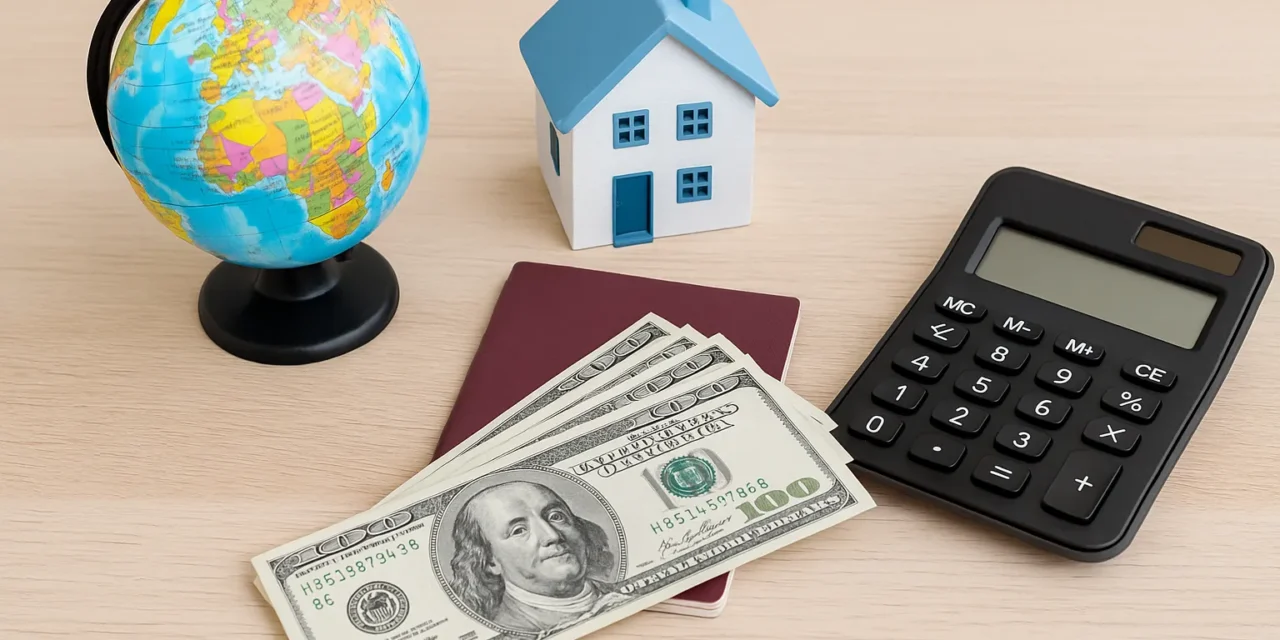Are you planning to move abroad? Moving abroad can change your life. It also changes your budget in ways that catch many people off guard. When you enter a new country, the financial systems, living costs, and support structures are often unfamiliar.
The money decisions you make early on affect everything from where you live to how you manage emergencies. And those early choices can shape your sense of security and comfort in the long run.
This guide offers practical advice on dealing with the financial side of your move. You’ll learn how to budget in unfamiliar environments, what to expect from local systems, and how to protect your savings while building a new life overseas.
Let’s get started.
Money Problems You Didn’t See Coming
When you move to a new country, the cost of settling in is rarely what you expect. Budget plans that worked before might fall apart after your first grocery shop, rent payment, or utility bill. Local rules about deposits, agency fees, or payment schedules often vary.
Even everyday costs like mobile data, public transport, or setting up home internet can be surprisingly high. These are often overlooked when planning a move. But they hit fast in the first few weeks. For example, in some cities, landlords demand several months of rent in advance and non-refundable service charges. These extra expenses can make you feel like you’re losing control before unpacking.
Banking systems can also create problems. You might face unexpected account fees, ATM charges, or currency conversion losses if you’re using a card from home. Small details like these can chip away at your spending power without warning.
The biggest surprise is often in the daily costs. Something as routine as getting a mobile plan or buying household essentials may turn into a bigger expense than planned. Without careful research, even essential services feel complicated and expensive.
Stress builds quickly if your money starts draining faster than expected. You’ll have to understand how financial systems work in your new environment. This is why it’s important to build a budget and track your spending closely.
Smart Budgeting for Your First Few Months
Moving to another country comes with new costs, and a clear budget helps you stay in control from the start. It’s important to focus on essential expenses and avoid overspending while you’re still adjusting to your new life.
Here are some smart budgeting tips to help:
- Know your fixed costs first: Research average rent, utilities, and food prices in your new city. For example, a studio apartment in Paris might cost much more than one in Lisbon, even in similar areas.
- Set up a weekly budget: Break your monthly income into smaller parts. If you have $2,000 for the month, try to spend no more than $500 each week. This keeps your spending under control.
- Track everything: Use a budgeting app or your bank’s tracking tools. Even small daily expenses can add up over time. Keeping track helps you see where your money is going.
- Plan for one-time costs: You might need to pay for internet setup, public transport cards, or basic kitchen items. Including these in your budget helps you stay prepared.
- Start saving right away: Open a local bank account and set up automatic transfers to a savings fund. Even saving a small amount each week makes a difference over time.
- Keep a cash buffer: Try to save at least one month’s rent as a backup. This gives you some breathing room if there’s a delay in income or a larger bill than expected.
Our observation found that smart budgeting gives you proper control while staying in a new environment, like abroad. It enables you to enjoy your new life with less worry.
Keeping Your Finances on Track
Once you settle into your new routine abroad, it’s time to start thinking long-term. Short-term budgeting gets you through the beginning, but stable habits keep your finances healthy over time.

Use these ideas to manage your money with more purpose:
- Review your monthly spending: Look at your recent purchases. Are you spending more than expected on food or transport? Use a budgeting app or your bank’s tools to check your habits. Adjust where needed to stay in control.
- Make smarter choices: Try cooking at home, using public transport, or shopping locally. These small changes reduce your overall cost and help you live better for less.
- Set clear savings goals: Think about what you want to achieve. Are you building an emergency fund? Saving for travel? Write down your goals so you feel focused.
- Automate your savings: Set up an automatic transfer from your income into a savings account. Once the money moves, you don’t have to think about it. It builds up without effort.
- Check in once a month: Take time to review your budget, check your income, and look at how costs are changing. If something feels off, adjust it early before it becomes a problem.
- Do your research regularly: Prices, rules, or service options might change in your new country. Staying informed helps you make better decisions and avoid surprises.
Building these habits gives you more control over your spending and your future. It makes daily life abroad feel less stressful and more secure.
What You Need to Know About Taxes and Social Security
Working abroad is exciting, but tax season can bring a few surprises. If you’re not sure what’s required in your new country or back home, it’s easy to make mistakes. The good news is, with a little knowledge and planning, you can avoid most of the trouble.
Do You Still Have to File Taxes at Home?
Probably, yes. Some countries want their citizens to report yearly income, even if they live or work overseas. This is done through a tax return. It is a form that shows how much money you made and whether you owe anything to your government.
If you skip filing, you could face late fees or find it harder to renew your visa in the future.
What Is Double Taxation and How Do You Avoid It?
Double taxation happens when both your home country and your host country try to tax the same income. This is where tax treaties come in.
A tax treaty is a deal between two governments that decides who can collect taxes from you. Tax treaties often reduce or remove one of the taxes, so you don’t pay twice. Not all countries have tax treaties, so it’s important to check before tax time.
What Is Tax Residency and the 183-Day Rule?
If you live in a country for more than 183 days in a year, you may become a tax resident there. That means you’re liable to pay taxes locally, even if you’re still tied to your home country. This is known as the 183-day rule.
Different places count days in different ways. Some follow the calendar year. Others look at any 12 months. Knowing when you become a tax resident can help you plan better and stay out of trouble.
What About Social Security Payments?
Social security helps fund public programs like pensions, healthcare, and disability support. If you’re working in your new country, you may need to pay into their system. That can feel frustrating if you’re already contributing at home.
To fix this, some countries have Totalization Agreements. These are special agreements that help you avoid paying social security twice and may let your contributions count in both countries.
For example, the United States has Totalization Agreements with countries like Canada, Germany, Japan, and the United Kingdom. You can find the full list on the U.S. International Social Security Agreements.
Need Help? Talk to Someone Who Knows This Stuff
Employment laws and tax rules are different everywhere. If you’re confused about how to file or what you’re supposed to pay, a tax expert who works with expats can save you a lot of trouble. They can help you avoid double taxation, file the right forms, and make sure you follow both local and home country rules.
Since we’re talking about protecting your money, now’s a good time to look at healthcare costs too. They often catch people off guard.
How Healthcare Costs Can Surprise You
Healthcare costs in foreign countries can quickly add up when you include travel insurance, medical bills, out-of-pocket fees, and visa health requirements. Many people don’t expect these costs to be so different, and sometimes, so high.

Let’s know some interesting facts about healthcare costs.
Why Healthcare Costs Are So Different
The cost of healthcare changes from one country to another. It depends on how the system works, how much care you need, and whether you’re a resident or visitor.
Here are a few real examples:
- United States: Health insurance for expats can cost around $7,200 per year (Source: Expat Network).
- Singapore: Premiums are often about $5,400 per year (Source: William Russell).
- Thailand: More affordable, with average yearly costs around $2,700 (Source: William Russell).
However, these numbers don’t include extra pay for emergency visits, prescriptions, or surgery.
What Kind of Health Insurance Should You Get?
Depending on where you live abroad, you might need one of the following:
- International health insurance: Covers care in many countries. Great if you move around often.
- Local insurance: Cheaper, but only works in one country. It may not cover everything.
- Public healthcare: Free or low-cost in some places, but it’s often limited for foreigners.
Always check your visa rules. Some governments require you to show proof of insurance before they let you in.
Some Effective Ways to Handle Healthcare Costs
- Research the healthcare system before you move.
- Look for plans that fit your budget and health needs.
- Access preventive care so you can stay healthy and avoid bigger bills later.
- Set aside savings for medical expenses, even if you already have coverage.
Planning helps you avoid surprise costs and makes sure you can get the care you need when it matters. Now that we’ve covered healthcare, let’s look at ways to build your savings and grow your money while living abroad.
How to Save and Invest From Abroad
Next up, we’ll show you our process for learning how to invest money. It helps you protect your income, plan ahead, and avoid costly mistakes. Many expats aren’t sure where to start, especially when dealing with unfamiliar banks or rules.
You can follow these steps to stay ahead.
Opening a Bank Account

We have already mentioned that one of your first steps should be setting up a local bank account. It helps you avoid extra fees and makes it easier to receive payments or pay rent. Some countries require a visa or proof of address, so check what paperwork you’ll need before you go. A local account gives you better access to everyday banking and helps organise your savings.
Keeping Retirement Savings Safe
If you already have retirement accounts at home, don’t lose track of them. Many expats pause contributions while living abroad, but that doesn’t mean you should ignore them. Regularly check your balances, fees, and rules if you’re earning income in a new country. Staying aware keeps your money growing, even if you’re far from home.
Making Smart Investments
Some online platforms won’t support accounts with overseas addresses. Do your research to find services like Interactive Brokers or Saxo Bank that work for foreign residents. Interactive Brokers is a global trading platform that lets you buy and sell stocks, ETFs, and other assets in multiple countries. Danish investment bank Saxo Bank also allows international users to trade online.
Also, look into investment options in your new country. Make sure you understand the local tax rules. Investing wisely protects your money and gives your savings a clear future.
Dealing With Two Currencies
Managing money across currencies adds another layer of complexity. Exchange rates can change quickly, which may affect your costs. We recommend using services like Wise or Revolut to keep fees low and transfers fast. Try to budget in your local currency to make your spending habits clearer and avoid losing track of real value.
You’ve got the tools to grow your money. Now, let’s make sure you’re ready if something goes wrong.
What If You Face a Money Emergency?
What if your wallet gets stolen, your employer misses a payment, or you face a sudden medical emergency in a foreign country? These things happen, and they can get expensive fast.
Here’s how to stay prepared:
- Build an emergency savings fund. Save at least $500–$1,000 in local currency. This money can cover basics like rent, food, or a medical visit if something goes wrong.
- Keep easy access to your money. Use an online bank or an international card that allows instant transfers or withdrawals. For example, services like Wise or Revolut let you move funds quickly without heavy fees, which is necessary in urgent situations.
- Have a backup card or account. If your main card is lost or blocked, a second bank account or credit card keeps you covered. You can still withdraw cash, pay for essentials, or book travel if something goes wrong. Make sure someone back home can access it if you need help.
- Plan for a sudden job loss. If your employer ends your contract early or you lose freelance work, having a small backup gives you time to regroup. Look into insurance or support options offered in your host country.
- Pay attention to insurance coverage. Research the best international or local health insurance plans before you arrive, so you’re not stuck with huge bills later.

Once your safety nets are in place, it’s time to focus on building peace of mind. Let’s wrap it all up with a few final tips.
Don’t Let Money Stress Ruin Your Move
Money problems are common for people moving abroad. But it don’t have to be. Learning about the system, getting advice, and planning your steps can help you feel more confident and secure.
It’s normal to feel uncertain at first. But each step you take, from setting up a budget to choosing the right insurance, makes a real comfort zone for you. Planning for your finances is about giving yourself peace of mind and freedom to enjoy your new life abroad.
If you want help making the process easier, Brian Mathews is ready to support you. Reach out to get expert advice and access tools that can help you feel confident in every decision you make.








 </a
</a